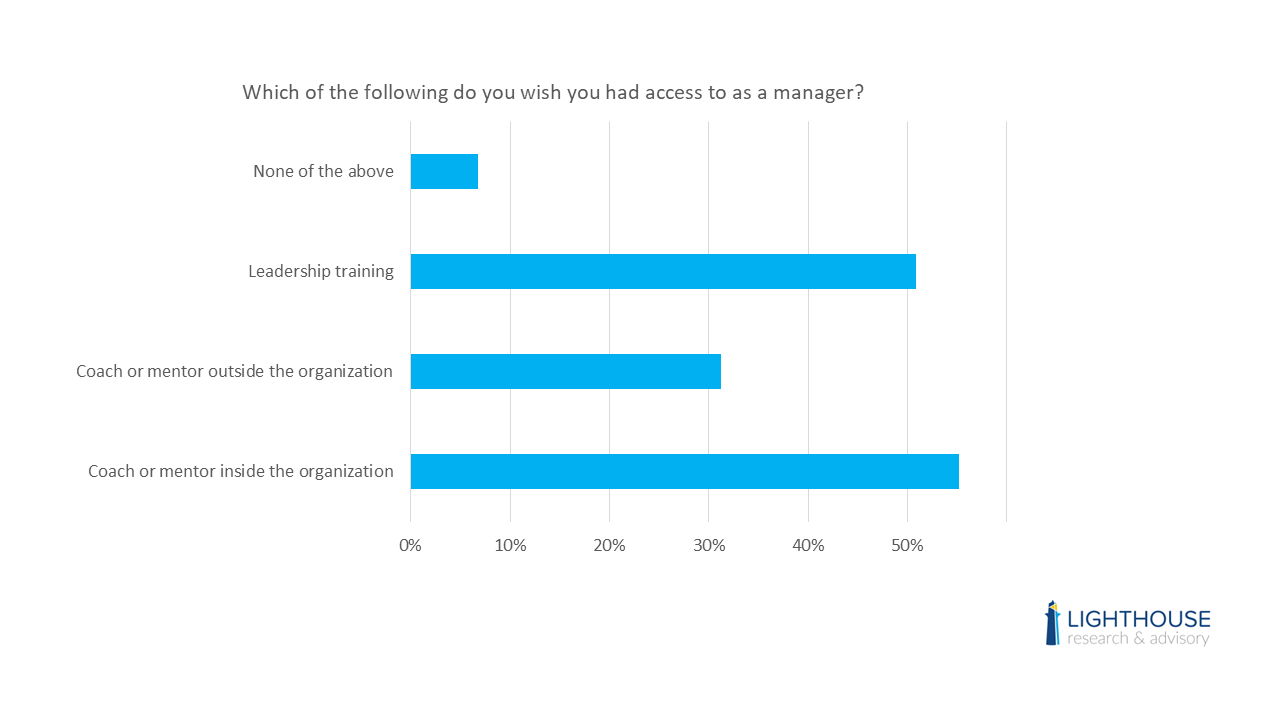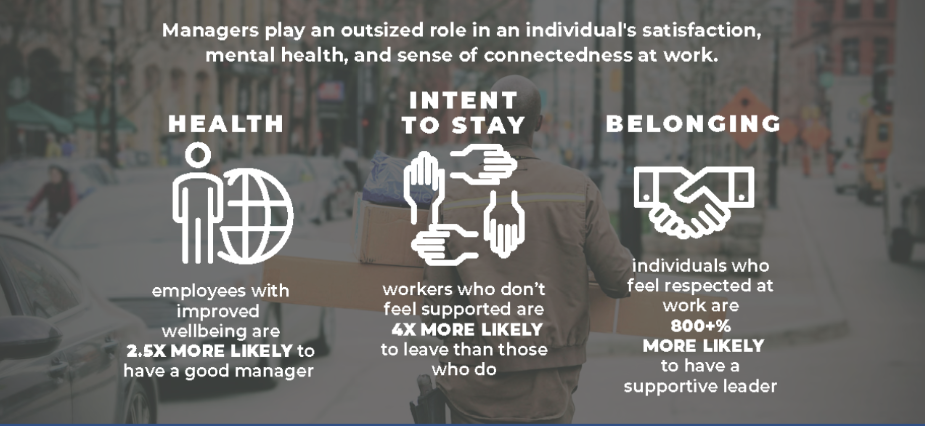Is Mentoring Outdated in Today’s Workplace?
The workplace is where people go to earn a living, be productive, and learn new skills, so why not use it as a way to develop your employees at the same time? Mentoring someone in the workplace can help them grow professionally while also benefiting their manager with stronger ties to the organization.
By the way, managers are people, too! In our recent Manager study, we found that managers were more likely to say they want a coach or mentor than other types of professional development.

Source: 2022 Lighthouse Research & Advisory Manager Insights Study (n=500)
The Practical Realities of Mentoring
When a supportive relationship has been established, both parties can benefit from it by being more productive at work, feeling happier and more engaged with their jobs (or careers), and improving their performance at work overall. Mentors and mentees can benefit from each other in many ways. A mentor can teach you new skills, help improve your performance at work, and build confidence in yourself. Likewise, a mentee can learn from their mentor’s experience, share their own knowledge with others (which could lead to promotions), and gain valuable insights into how they could improve their career trajectory.
As an added bonus: mentors often report feeling more engaged with their jobs after starting to mentor someone else because they feel like they have made a difference in someone’s life–something that not everyone gets from their job, honestly.
Mentoring also helps promote engagement because it builds strong relationships between mentors and mentees, which means mentees feel confident about approaching their mentor for advice or feedback about their performance. Therefore, a workplace with a mentoring program can expect to see an increase in employee engagement as well as better job satisfaction among its staff. The more engaged employees are with their work environment and tasks, the more productive they will be at performing those tasks. By providing employees with a mentor, you are giving them an opportunity to learn from someone who has more experience than they do. This can help to improve their skills and performance over time, which is why it’s important for organizations to offer a mentoring program.
What does recent research data say about mentorship at work?
Research has shown that mentorship can improve work performance and job satisfaction, as well as increase the likelihood of career development and promotion. Mentorship also helps to foster workplace culture, engagement, employee retention and diversity/inclusion. However, mentorship programs can be difficult to implement and sustain. They are often underutilized or poorly managed, which can lead to poor results. To avoid these pitfalls, it’s important for employers to have a clear strategy for mentorship programs that includes:
- Defining the goals and desired outcomes of your program -Creating a plan for how to reach those goals (e.g., identify potential mentors, provide training on mentorship best practices)
- Implementing an evaluation strategy to measure progress
- Establishing a monitoring process to ensure the program remains on track
- Monitoring the program and making any necessary adjustments to ensure ongoing success -Maintaining a strong commitment from leadership, who must be willing to provide time and resources for implementation
Sometimes all it takes is one conversation with another person to help you see things differently.
Talking to a mentor, coach or even a friend can be beneficial because they’re not directly involved in your work environment and can provide perspective that’s not clouded by emotion or bias. Having someone there who’s willing to listen when you need them most can make all the difference when it comes time for advice on resolving conflict at work or figuring out how best to handle an employee who isn’t pulling their weight.
Managers Can be Mentors, Too
If your company is not in a position to launch a mentoring program, the power of a great manager or leader has a huge impact on employees. In recent research by Lighthouse Research & Advisory, frontline workers were impacted not just internally, but externally.

Mentoring in the workplace is a great way to help your employees develop and grow. Mentors can be an invaluable resource for new hires or those who need some guidance on how best to perform their job duties. But there’s more than just work benefits here–mentoring has many personal benefits as well! By helping others learn and grow in their careers, we also get better at our own jobs by learning from them. In July of 2022 statistics from The Mentor Method stated that 84% of Fortune 500 companies and 100% of Fortune 50 companies have mentoring programs. So if you haven’t already started mentoring someone at work, now is the time!
As always, Be The Change.

George Rogers is the Chief Strategy Officer at Lighthouse Research & Advisory. He is an author, coach, and globally renowned keynote speaker acclaimed for delivering compelling insights on cultivating purpose-driven, profitable businesses. As a leader developing inclusive and motivating workplace environments, he consistently provides transformative perspectives and guidance to organizations worldwide. Over the past two decades, he has dedicated himself to inspiring leaders and transforming workplace cultures.
In his book Champion Your Purpose, we learn that finding purpose in life looks different for everyone, and very few will find the exact common purpose that aligns the exact same. He provides a step-by-step approach to help readers identify their purpose and align it with their personal and professional goals.
His research focuses on leadership and its impact on performance, engagement, culture, mental health, inclusion, and belonging. If you ask him what led him to the HR space, he will remind you that his passion and purpose are championing people.
With over 25 years of leadership and keynote speaking experience, he has inspired, empowered, and challenged every audience —virtually and in person —to discover their purpose in the workforce, learn how to Champion Your Purpose individually, and lead the life they love.
